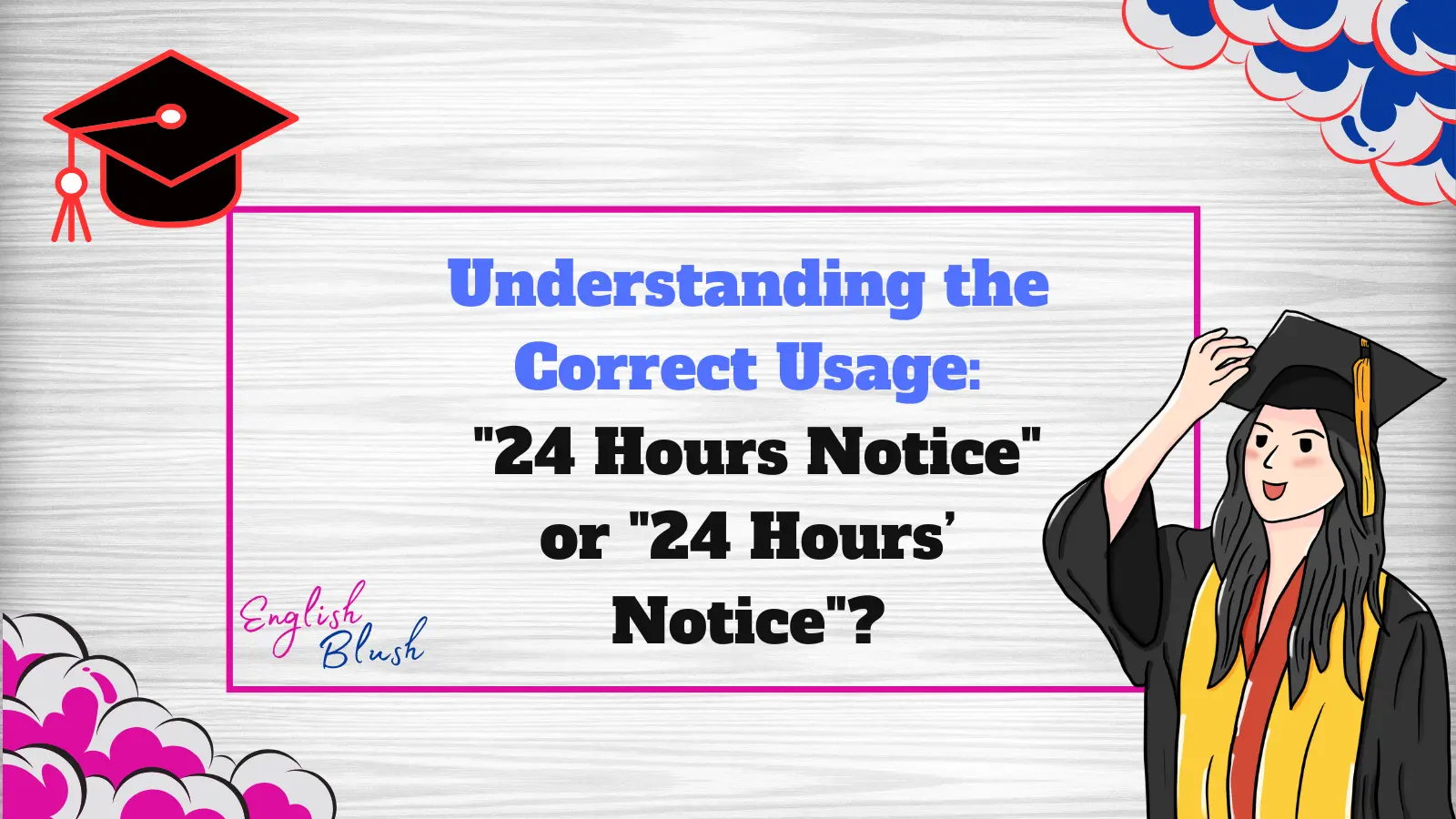When we talk about notices and how they are written, sometimes it can be confusing whether to use “24 Hours Notice” or “24 Hours’ Notice.” In this article, we will break it down step-by-step, explaining the difference between the singular possessive, plural possessive, and plural forms. Let’s get started!
What Is a Possessive?
Before we dive into the examples, let’s understand what a possessive is. A possessive shows ownership or that something belongs to someone or something. For example:
- Singular Possessive: This shows that one thing or person owns something. Example: Tom’s book (Tom owns the book).
- Plural Possessive: This shows that more than one thing or person owns something. Example: The boys’ toys (The toys belong to multiple boys).
Let’s Break Down “24 Hours Notice” and “24 Hours’ Notice”
In our case, we are talking about the word “notice.” The difference between “24 Hours Notice” and “24 Hours’ Notice” depends on how we use “hours” in the sentence. We will look at these two phrases using singular possessive, plural possessive, and plural forms.
Singular Possessive: “24 Hour’s Notice”
In this case, we are talking about just one hour. The apostrophe shows that something belongs to that hour.
- Example: I need a 24 hour’s notice (The notice belongs to 1 hour).
| Singular Possessive | Example Sentence |
|---|---|
| 24 Hour’s Notice | Please give me 24 hour’s notice before you leave. |
Plural Possessive: “24 Hours’ Notice”
Here, we are talking about more than one hour (24 hours). The apostrophe goes after the “s” because we’re talking about more than one hour.
- Example: You need to give 24 hours’ notice (The notice belongs to 24 hours).
| Plural Possessive | Example Sentence |
|---|---|
| 24 Hours’ Notice | She asked for 24 hours’ notice before making a decision. |
Plural Form: “24 Hours Notice”
In this case, “hours” is simply a plural form of “hour,” and we are not showing possession. This means we are just talking about 24 hours in general, not something that belongs to the hours.
- Example: The event needs 24 hours notice (Just talking about 24 hours, no possession).
| Plural Form | Example Sentence |
|---|---|
| 24 Hours Notice | I will need 24 hours notice to prepare. |
When to Use Each One
Let’s look at when to use each of these forms:
Use “24 Hour’s Notice” (Singular Possessive)
- Use this form when talking about just one hour.
- Example: You need a 24 hour’s notice (Notice belongs to 1 hour).
Use “24 Hours’ Notice” (Plural Possessive)
- Use this form when talking about multiple hours (24 hours).
- Example: She gave 24 hours’ notice (Notice belongs to 24 hours).
Use “24 Hours Notice” (Plural Form)
- Use this form when you are simply talking about 24 hours, not showing ownership.
- Example: The office requires 24 hours notice (Not showing possession).
A Simple Comparison
Let’s quickly compare all three forms with a table:
| Form | Example Sentence | Meaning |
|---|---|---|
| 24 Hour’s Notice (Singular Possessive) | I need 24 hour’s notice to cancel. | Talking about 1 hour’s notice. |
| 24 Hours’ Notice (Plural Possessive) | She gave 24 hours’ notice for the meeting. | Talking about 24 hours’ notice. |
| 24 Hours Notice (Plural Form) | I need 24 hours notice to prepare. | Talking about 24 hours, no ownership. |
Conclusion
So, the next time you need to decide between “24 Hours Notice” and “24 Hours’ Notice,” just remember the difference:
- Use 24 Hour’s Notice for just one hour.
- Use 24 Hours’ Notice for 24 hours, showing possession.
- Use 24 Hours Notice when you’re simply referring to 24 hours without showing possession.
By understanding these rules, you’ll be able to write clearly and correctly when using terms like these in everyday language!





